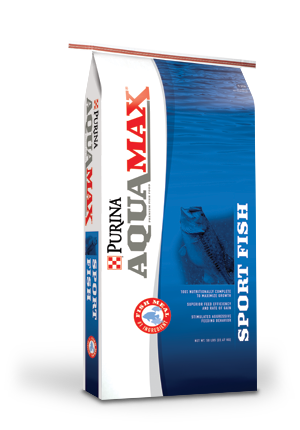
100% nutritionally complete and was developed by professional nutritionists and fish experts.
Formulated as an easily-digestible, high-energy, nutrient-dense diet with excellent conversion rates, Sport Fish Largemouth has high feed efficiency and rate of gain and is designed to stimulate aggressive feeding behavior. AquaMax® Sport Fish Largemouth is a floating product in a in a 3/4″ x 1″ extruded pellet.
Species Largemouth Bass
Type Finisher
Nutrient Analysis
Nutrient Min / Max Amount
Crude Protein MIN 45.00 %
Crude Fat MIN 10.00 %
Crude Fiber MAX 4.00 %
Calcium (Ca) MIN 1.60 %
Calcium (Ca) MAX 2.10 %
Phosphorus (P) MIN 1.00 %
Sodium (Na) MAX 0.60 %
Feeding Directions
Description High-protein, nutrient-dense diets are required to support healthy growth in this type of species. Fish include: feed-trained largemouth bass, hybrid striped bass, bluegill sunfish, and rainbow trout. See feeding strategies for feeding directions on specific species.
Caution Store in a dry, well-ventilated area protected from rodents and insects. Do not feed moldy or insect-infested feed to animals as it may cause illness, performance loss or death.
Management Practices Consumption can vary depending upon water temperature, season of the year, nutritional needs of the fish, availability of other foods and fish familiarity with particle feeds. Consult the feed tag on this package for specific feeding directions.
A feeding program is only as effective as the management practices followed. Actual results may vary depending upon feed intake, environmental conditions and the quality of management practices. An effective feeding maximizes feed conversion rates which helps minimize the risk of water quality degradation. However, it is necessary to follow good management practices and feed ONLY what the fish will consume. Excess feed increases the Biochemical Oxygen Demand (BOD) which over time, can contribute to the deterioration of your water quality. Adequate Dissolved Oxygen (D.O.) must be maintained for sport fishing ponds; aggressive feeding should be accompanied by an adequate aeration program.
